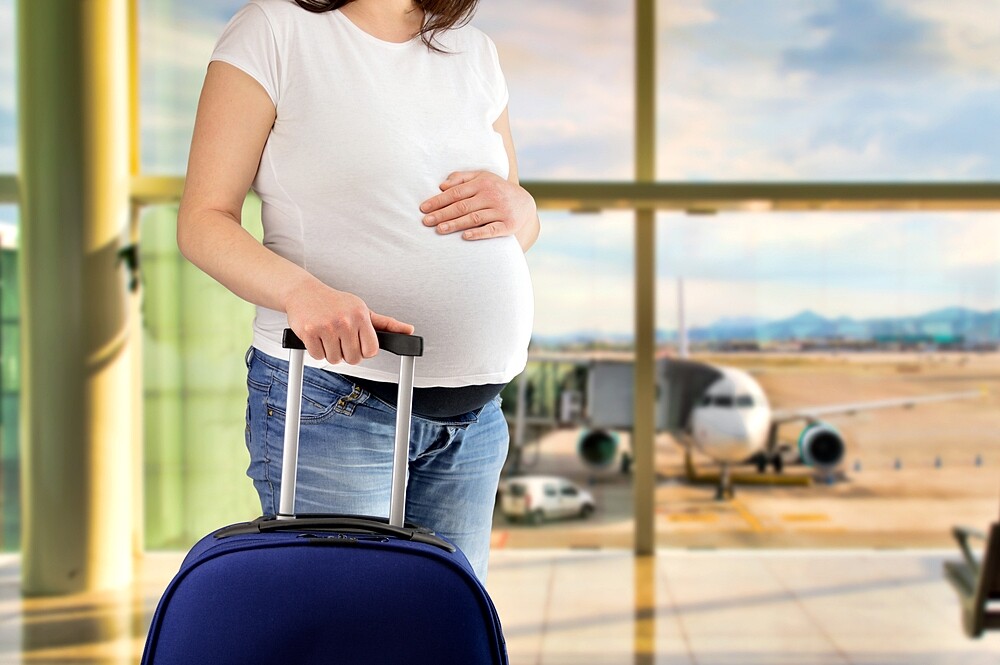Flying while pregnant – is that safe? We clarify the most important questions, possible risks and tell you what you should pay attention to.
Another little holiday in the warmth before life starts in threes? Flying while pregnancy is possible, but there are still some important points you should consider …
Flying while pregnant: You need to know this
- Pregnant women should avoid flying in the first trimester: Especially in this sensitive phase of development, flying can be harmful to the embryo: At high altitudes, radiation exposure in airplanes increases. Ionising radiation increases the risk of malformations, especially in the early stages of pregnancy. In addition, many pregnant women are affected by morning sickness in the first third of the pregnancy. Women who fly a lot for professional reasons should consult their doctor.
- In the second trimester (especially between 18 and 24 weeks of pregnancy), air travel is possible if the pregnant woman is in good general condition and the pregnancy proceeds without complications.
- From about the 29th week of pregnancy onwards, pregnant women should only fly if they are in good health and have no complications. If necessary, a doctor should be consulted.
- Especially with an advanced pregnancy, the tightness of the seat or toilets in the plane can become a problem. From the 30th week of pregnancy onwards, the confined space in airplanes could already be perceived as very unpleasant by pregnant women.
- From the 34th/35th week of pregnancy pregnant women should no longer board an aircraft.
Flying during pregnancy is not recommended for:
- Increased risk of premature birth and miscarriage
- Anemia
- Cardiovascular diseases
- Risk pregnancy due to age
- Malposition of the placenta
Consult your doctor about this!
Flying while pregnant: Conditions of the airlines
- Depending on the airline there are different regulations regarding the carriage of pregnant women. From the 28th week of pregnancy onwards, most airlines require a medical certificate proving that the pregnant woman is fit to fly. From the 35th week of pregnancy onwards, pregnant women are no longer carried by most airlines (in the case of a multiple pregnancy, the 32nd week of pregnancy applies).
- So always ask the airline directly which regulations apply. Often the airlines have appropriate forms that the gynaecologist can fill out. Remember that the certificate for the flight must not be older than two weeks.
Flying while pregnant: 8 tips for pregnant women
- As the length of the flight increases, the risk values of air travel increase for pregnant women: long-haul flights are more dangerous than short-haul flights because the risk of thrombosis increases.
- Try to walk a few steps in the corridor during the flight (best every half hour). This will get your blood circulation going and reduce the risk of thrombosis. Medical compression stockings should be an additional measure.
- Find out about the provisions of your international health insurance: Some insurance policies do not cover the costs of childbirth or pregnancy complications abroad.
- If necessary, take out a travel cancellation insurance if complications arise before your trip.
- At check-in, a place with as much legroom as possible and in the aisle is advisable.
- Make yourself as comfortable as possible during the flight, i.e. wear comfortable clothing, make sure you have enough legroom, fasten your seat belt underneath your stomach and drink plenty of fluids!
- Carry your mother’s passport or a copy of it with you.
- Check the formalities for your holiday destination beforehand: What are the entry requirements for pregnant women? Are there local doctors on site in case of complications? How is the medical care? Is there a risk of possible infectious diseases in the holiday country?
Flying while pregnant: What about radiation, oxygen pressure, etc.?
- Even if radiation exposure in an airplane increases, a single long-haul flight in pregnancy is generally not considered harmful.
- The airport scanners at check-in are not dangerous for the baby. These are just metal detectors and no X-rays.
- In airplanes the oxygen pressure is reduced. This is not harmful for the mother-to-be and the baby, unless the function of the placenta is restricted.

